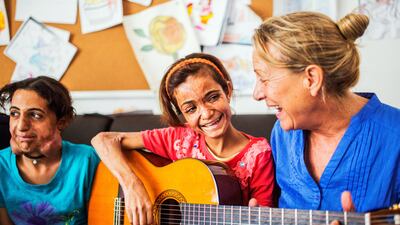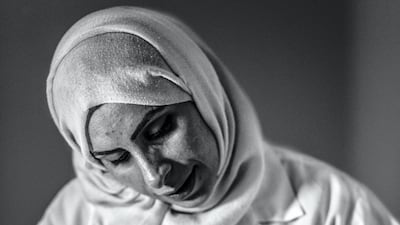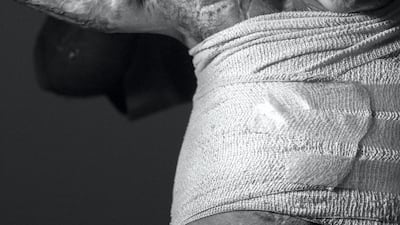Rabee’ Rajoob was on his way to buy bread one spring morning in Homs when he got caught up in the crossfire between Syrian government forces and rebel fighters. An army sniper shot him in the right shoulder, damaging his nerves, tearing his lower jaw and shattering his teeth.
Mr Rajoob, 32, who was working as a blacksmith at the time, remained unconscious for five days following the attack in March 2012. When he woke up in hospital after surgery he thought he had lost the use of his right arm permanently and that his jaw would remain disfigured.
“When I woke up, I was depressed but I am a person who believes in fate. One should accept his destiny and adjust to the situation,” he said.
Following the attack, Mr Rajoob underwent repeated procedures in Syria and then at a hospital in Jordan. But it wasn't until he began receiving treatment at a reconstructive surgery hospital run by Médecins Sans Frontières in February 2013 that he saw real improvement in his condition.
________________
Read more:
Love songs fail to save Palestinian marriage after war’s devastating wounds
Saudi hospital offers small steps of hope for Gazan amputee girl
________________
"Now I look at my face and I am in high spirits," he said from his bed in the Amman hospital. "It has really improved. I also underwent several surgeries to release the nerve in my shoulder and I can move my arm better."
The MSF hospital where Mr Rajoob is receiving treatment marks 10 years of carrying out reconstructive surgery this month. The facility was originally established to treat Iraqi victims of war who were suffering from complex injuries such as bone gaps and fractures, soft tissue and nerve injuries, and severe burns that limited mobility.
But as violence spread to other parts of the region, the surgical programme expanded, with the hospital opening its doors to patients from Yemen, Syria and Gaza. In 2015, the hospital relocated to a bigger building in the Jordanian capital to cope with the increasing demand for its services. Today, between 500 and 600 patients receive treatment at the hospital every year.
Rashid Fakhri, an orthopaedic surgeon at the hospital, said the types of injuries patients were being treated for differed depending on what country they came from. Most of the facility's Iraqi patients were suffering from injuries caused by car bombs, while its Yemeni patients were mostly the victims of bombings or shootings. Most of the Syrians the hospital received at the start of the Syrian war were suffering from bullet wounds. Now, however, the majority are the victims of barrel bombings.
While all cases are complex, Dr Fakhri said priority was given to victims suffering from nerve injuries. “It is a serious condition and from a medical point of view, they should not wait,” he said. “But patients with non-union injuries, where a broken bone fails to heal due to a lack of adequate stability or blood flow, are not a clinical priority since [treatment] is an elective surgery that does not require urgent treatment.”
Dr Fakhri said he becomes emotional when he sees his patients in the process of healing, especially children. “You see that they were disabled by their injuries and after treatment they play football at the hospital’s playing area and jump around … One had mouth injuries [and] could not speak [before his treatment], and when [I] heard him shouting for the first time, it was very emotional.”
On the hospital wards, some patients have amputated hands and legs, while others have been badly scarred by explosions. After several months of treatment, many are now able to walk the facility's corridors with the aid of crutches.
Shaje’ Nu’man, a computer engineer from Aden in Yemen, was shot in his lower right leg in October 2015 when he tried to stop an unknown gunman from looting his workplace amid the deteriorating security situation in the country.
“I fought him but he shot me with a Kalashnikov,” said the 34-year-old, who initially received treatment from MSF staff in Aden.
________________
Read more:
MSF doctor’s journey of a lifeline to help the world’s vulnerable
The climb of hope: Palestinian teenage amputees in bid to scale Kilimanjaro
________________
Unable to move his right foot, however, he was admitted to the organisation's reconstructive surgery hospital in Amman in June 2017 for specialist treatment. After several operations there, the mobility in his foot has improved and he can walk on crutches.
“My pain has improved,” he said. “My leg used to hurt all the time.” He is scheduled for another operation on Monday to lengthen the bone.
In a different room lay Atheer Hameed, a 24-year old from the Iraqi city of Fallujah who was injured by shrapnel from a mortar shell that landed near his home in September 2014.
“I was home [at the time] and was supposed to join my parents [for] lunch at our relatives,” he said. “I wrapped wire round my foot to stop the bleeding and shouted for help until the neighbours came.”
Despite undergoing surgery in Fallujlah, Mr Hameed was still unable to lift his foot and was dependent on crutches. Now recuperating on his hospital bed after surgery at the MSF hospital a week before, however, Mr Hameed looked hopeful.
“The first thing I want to do when I return home is get married,” he said. There is no fiancée but he has his eye on his cousin.
Laura Hamiliton-Gordon, the manager of psychosocial care at the hospital, said that seeing others in a similar situation to them encouraged patients to open up more about their experiences. And although many of the hospital's patients come from different countries and backgrounds, their injuries appeared to make them more empathetic towards each other.
This certainly seemed to be true for Mr Rajoob, the Syrian patient from Homs.
“I try to put a smile on other patients' faces,” he said.







